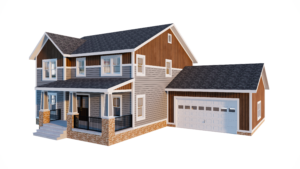The California Title 24 solar energy code requires all new residential, commercial and multi-family constructions to have a solar system, barring a few exceptions. Below are a few simple calculators that would help you calculate the minimum solar size as required by the Title 24 code and also a list of exceptions that the code allows.
You can jump to the relevant calculators if you would like:
Minimum required solar for Single Family Residences
Minimum required solar for Low Rise Multi-Family Residences
Minimum required solar for Commercial and High Rise Residential
 Minimum required Title 24 solar for Single Family Residences per Title 24
Minimum required Title 24 solar for Single Family Residences per Title 24
This section applies to all single family residences and ADUs that are new constructions. If you would like to confirm if your ADU is indeed a new construction and not an addition/alteration/conversion instead, please read this blog.
Equation to calculate minimum PV size per the Residential Title 24 energy code:
EQUATION 150.1-C ANNUAL PHOTOVOLTAIC ELECTRICAL OUTPUT
kWPV = (CFA × A)/1000 + (NDU × B)
WHERE:
kWPV = kWdc size of the PV system
CFA = Conditioned floor area
NDU = Number of dwelling units
A = CFA adjustment factor from Table 150.1-C
B = Dwelling unit adjustment factor from Table 150.1-C
List of Exceptions:
EXCEPTION 1 to Section 150.1(c)14: For steep slope roofs, SARA shall not consider roof areas with a northerly azimuth that lies between 300 degrees and 90 degrees from true north. No PV system is required if the SARA is less than 80 contiguous square feet.
EXCEPTION 2 to Section 150.1(c)14: No PV system is required when the minimum PV system size specified by Section 150.1(c)14 is less than 1.8 kWdc.
EXCEPTION 3 to Section 150.1(c)14: Buildings with enforcement-authority-approved roof designs, where the enforcement authority determines it is not possible for the PV system, including panels, modules and components and supports and attachments to the roof structure, to meet the requirements of the American Society of Civil Engineers (ASCE), Standard 7-16, Chapter 7, Snow Loads.
EXCEPTION 4 to Section 150.1(c)14: For buildings that are approved by the local planning department prior to January 1, 2020 with mandatory conditions for approval:
- Shading from roof designs and configurations for steep-sloped roofs, which are required by the mandatory conditions for approval, shall be considered for the annual solar access calculations; and
- Roof areas that are not allowed by the mandatory conditions for approval to have PVs, shall not be considered in determining the SARA.
EXCEPTION 5 to Section 150.1(c)14: PV system sizes determined using Equation 150.1-C may be reduced by 25 percent if installed in conjunction with a battery storage system. The battery storage system shall meet the qualification requirements specified in Joint Appendix JA12 and have a minimum usable capacity of 7.5 kWh

Minimum required solar for Low Rise Multi-Family Residences per Title 24
This section applies to all low rise multi-family projects (i.e. multi-family projects <3 habitable stories) that are new constructions.
Equation to calculate minimum PV size per the Low Rise Multi-Family Title 24 energy code:
EQUATION 170.2-C ANNUAL PHOTOVOLTAIC ELECTRICAL OUTPUT
kWPV= (CFA × A)/1000 + (NDU × B)
WHERE:
kWPV= kWdc size of the PV system
CFA =Conditioned floor area
NDU= Number of dwelling units
A= CFA adjustment factor from Table 170.2-T
B= Dwelling unit adjustment factor from Table 170.2-T
List of Exceptions:
EXCEPTION 1 to Section 170.2(f): For steep slope roofs, SARA shall not consider roof areas with a northerly azimuth that lies between 300 degrees and 90 degrees from true north. No PV system is required if the SARA is less than 80 contiguous square feet.
EXCEPTION 2 to Section 170.2(f): No PV system is required when the minimum PV system size specified by section 170.2(f) is less than 1.8 kWdc.
EXCEPTION 3 to Section 170.2(f): Buildings with enforcement-authority-approved roof designs, where the enforcement authority determines it is not possible for the PV system, including panels, modules and components and supports and attachments to the roof structure, to meet the requirements of the American Society of Civil Engineers (ASCE), Standard 7-16, Chapter 7, Snow Loads.
EXCEPTION 4 to Section 170.2(f): For buildings that are approved by the local planning department prior to January 1, 2020, with mandatory conditions of approval:
- Shading from roof designs and configurations for steep slope roofs shall be considered for the annual solar access calculations; and
- Roof areas that are not allowed to have PVs by the mandatory conditions of approval shall not be considered in determining the SARA.
EXCEPTION 5 to Section 170.2(f): PV system sizes determined using Equation 170.2-C may be reduced by 25 percent if installed in conjunction with a battery storage system. The battery storage system shall meet the qualification requirements specified in Joint Appendix JA12 and have a minimum usable capacity of 7.5 kWh.
 Minimum required solar for Commercial projects per Title 24
Minimum required solar for Commercial projects per Title 24
This section applies to all commercial, high rise residential and mixed use projects that are new constructions
Equation to calculate minimum PV size per the Commercial Title 24 energy code:
EQUATION 140.10-A PHOTOVOLTAIC DIRECT CURRENT SIZE
kWPVdc = (CFA x A)/1000
WHERE:
kWPVdc= Size of the PV system in kW
CFA= Conditioned floor area in square feet
A= PV capacity factor specified in Table 140.10-A, for the building type
Where the building includes more than one of the space types listed in Table 140.10-A, the total PV system capacity for the building shall be determined by applying Equation Table 140.10-A to each of the listed space types and summing the capacities determined for each.
List of Exceptions:
EXCEPTION 1 to Section 140.10(a). No PV system is required where the total of all available SARA is less than three percent of the conditioned floor area.
EXCEPTION 2 to Section 140.10(a). No PV system is required where the required PV system size is less than 4 kWdc.
EXCEPTION 3 to Section 140.10(a). No PV system is required if the SARA contains less than 80 contiguous square feet.
EXCEPTION 4 to Section 140.10(a). Buildings with enforcement-authority-approved roof designs, where the enforcement authority determines it is not possible for the PV system, including panels, modules, components, supports, and attachments to the roof structure, to meet ASCE 7-16, Chapter 7, Snow Loads.
EXCEPTION 5 to Section 140.10(a). Multi-tenant buildings in areas where a load serving entity does not provide either a Virtual Net Metering (VNEM) or community solar program.


